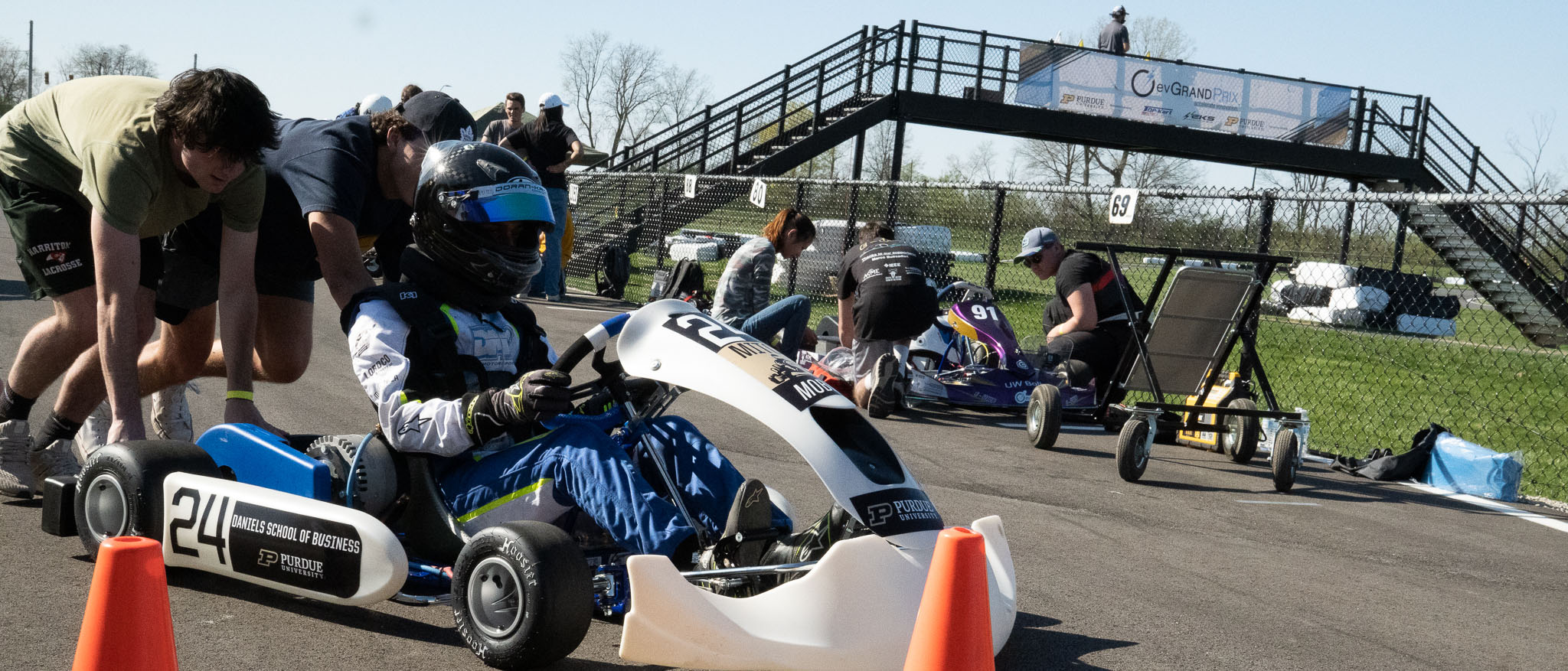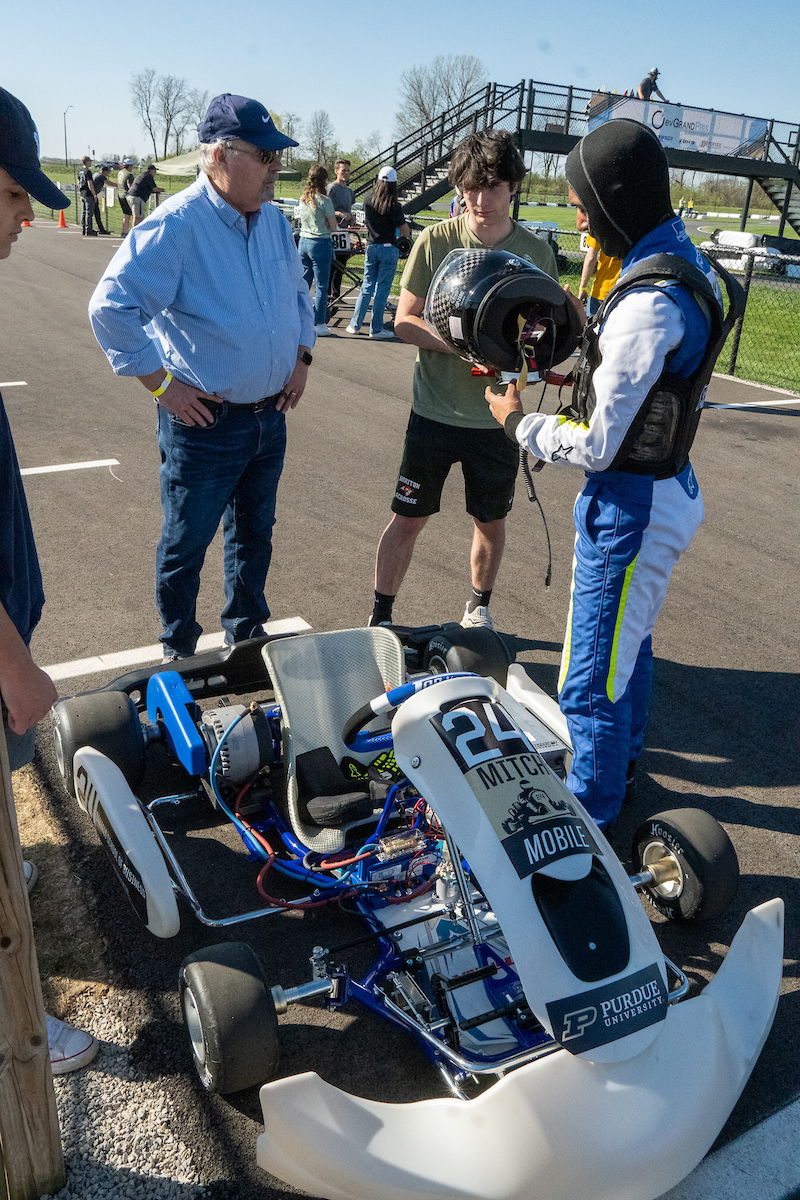
When spring semester 2023 kicked off, the Daniels School of Business EV go-kart team had an empty lab in the basement of the Krannert Building, a TopKart kit, and the safety code clearances to begin their virtually integrated project (VIP). For the five freshmen in the Integrated Business and Engineering (IBE) program, who hoped to face 14 other teams with karts they were already tweaking and testing, the situation might have seemed dire.
Not for this team, though. Losing a semester of building had tested their grit, but Athreya Ramanan, Mic Ricelli, Liam White, Ryan Lampe and Nicole Welsh set straight to work. An experienced Formula 4 car and kart driver, Ramanan channeled his mechanical knowledge to leading the build. Ricelli, who grew up tooling on his dad’s vintage corvette and old trucks, eagerly tackled the EV Kart learning curve. White also had a little experience tooling around with cars during high school, but engine-work was entirely new to Lampe. They had signed up for the autonomous motorsports projects their VIP and heard about the chance to join the EV go-kart team. Ramanan and marketing specialist Welsh’s passion for Formula One racing drew them to say “yes!” to a chance to innovate kart racing. Welsh pivoted to managing parts and communications until they knew the team had a race-able kart to market.

The Mitch Mobile Team poses before the race: (left to right) Mic Ricelli, Athreya Ramanan, Liam White, Nicole Welsh, Ryan Lampe, Steve Dunlop and Ryan Case.
The EV go-kart VIP project was the brainchild of the Daniels School’s Jim Caruthers and inaugurated by Steve Dunlop, who enlisted a 2010 marketing class to plan the race’s first year, which included two international teams and two races, one at the Indianapolis Motor Speedway. Dunlop’s assistant Courtney Huckstep was one of the marketing students who planned that first race, and so naturally she said yes when Dunlop asked her to mentor the 2023 IBE team. Dunlop, Huckstep, and IBE Academic Program Director Ryan Case spent the fall semester reminding the freshmen to keep their eyes on the prize. They could complete the build in time.
“We were given basically just the Lego set of a go-kart — everything we needed — so we just had to figure out how to put it together,” White says. Except they had to transform the power source of the kart from an internal combustion engine (ICE) to an EV. They’d have no time before April 1, their first chance to test the kart on the track, “to do things in CAD” — tweak the torque, test the power band of the battery, or gather data for other improvements. At this point, their goal was to run the race, completing all laps, a challenge when a driver needs to moderate speed with length of vehicle to maximize battery power.

Pressure makes diamonds, and strong teams, it turns out. Just before spring break, they’d made significant progress on the build and a small start on marketing. Dunlop helped Welsh secure sponsorship from the UAW, and the team settled on the name the “Mitch Mobile,” which they pitched for permission. Two weeks after spring break, they’d need to test the battery and then run the kart on the track. They still needed funds for a track-side tool kit, spare tires, four driver suits and helmets for the team. Though the IBE program sponsored the kart kit, Welsh, as marketer, needed to appeal for more donations to meet the budget.
With approval for the name Mitch Mobile, the last hurdles were little bugaboos: a gasket here, the means to mount the battery, and a wiring inspection. Days before practice, TopKart’s representative cleared it for its first run.
The first practice ended after 10 laps. The battery shut down, leaving the team a week to trouble shoot it. With help from a UAW representative, Ramanan and the team tested each connection with an altimeter. Two days before the race, they took the kart to the track, with the hope that each team member would have a shot behind the wheel after running all 50 laps. Ramanan suited up. Micelli, White and Lampe readied the kart, and the race organizers explained the procedures. Welsh donned a yellow safety vest to work the infield. For 20 laps, Ramanan tore up the track with the second fastest lap speed — then the battery overheated. Tension built as they brought out the altimeter. After some cooling time, the engine restarted, but the overheating remained an unknown. Why was it shutting down? If it was overheating, that boded badly. The temps predicted for the race were in the high-eighties.

Liam White and Mic Ricelli (left to right) put the tires on the kart for practice.
Meanwhile, another team’s kart overheated on the far end of the track. After pushing the kart on its rack into the grass and moving away from it, it popped and cracked. The lithium battery burst into flame, one cell at a time exploding. Minutes later, the fire department screamed into the parking lot as teams pushed their karts out of the gated track area. Team Mitch Mobile felt relief their battery merely shut down. In 10 years, no such hazard had happened, Dunlop said, but it illustrated the perils that had prompted the extra fire code caution in the fall semester. Now they just had to find the source of the battery shutdown.
The EV Grand Prix is more event than race, especially when it comes to winning. Points are awarded in three categories: kart design, optimization tweaks, and race performance. With a brand-new kart, relatively unoptimized and with a new design, hopes lay on Ramanan’s four years as an experienced race driver.
“On race day I was getting chills just seeing Athreya (Ramanan) just thrashing it around the track, overtaking people. It was such a cool thing to see and just like a month ago, this thing was on a stand with no wheels, no battery, nothing on it, and it was just so cool to see we put together,” says White.

“It’s important to get your hands dirty,” says Steve Dunlop, managing director for the Dauch Center for the Management of Manufacturing Enterprises, of students in the exclusive Integrated Business and Engineering program. “And you get your hands dirty by doing projects,” which is why the IBE faculty created vertically integrated projects (VIP) for students to earn credit that extend their research with design projects in their field.
The VIP program kicks off early in the undergraduate schedule and continues, often up to seven semesters. Projects are interdisciplinary, aligned with active research at Purdue, and often industry-sponsored. Graduate students and faculty mentor students. Beyond the EV Go kart event, some of the projects that the faculty have developed for IBE in 2023-24 include integrating the analytics tool PowerBI into various companies, providing recommendations of floor layout for manufacturing companies, employing better uses for the IoT in industry, and 3D printing and digital scanning to create parts for manufacturing, as well as using drones. IBE will add 40-50 more students and double its projects for the 2023-24 year.
“IBE has a vision for having a much larger space of doing the same type of thing for more students, so we're looking at theoretically teaming up in the Daniels School’s new building. So, we would both bring students in to get their hands dirty and start playing with stuff. We can also bring in companies because it will a useful demonstration space.”
Seven of 15 cars finished the race. At one point, the Mitch Mobile Team was running in second place, though the battery once again shut down at lap 37. For a first-year kart, the team felt proud of the outcome. The following Wednesday, the team reconnoitered in the lab with Dunlop, Huckstep and Case to present plans for next year. They had all found room in their schedule to continue the project, and now they had post-race data and a plan. Dunlop coached them on topics for each team member to study up on over the summer. Welsh would expand their marketing outreach. They’d study torque, optimize the battery, and come up with a battery saving system, among other plans. A visitor from the business school's Dauch Center for the Management of Manufacturing Enterprises (DCCME) came to 3D scan the kart to build parts for next year’s optimization.
They’d left certain they’ll own the event’s top place in 2024, and they’d mentor a second team, in keeping with Dunlop’s vision includes adding a team for the next five years, giving IBE teams a chance to dominate and revolutionize the EV kart technology.